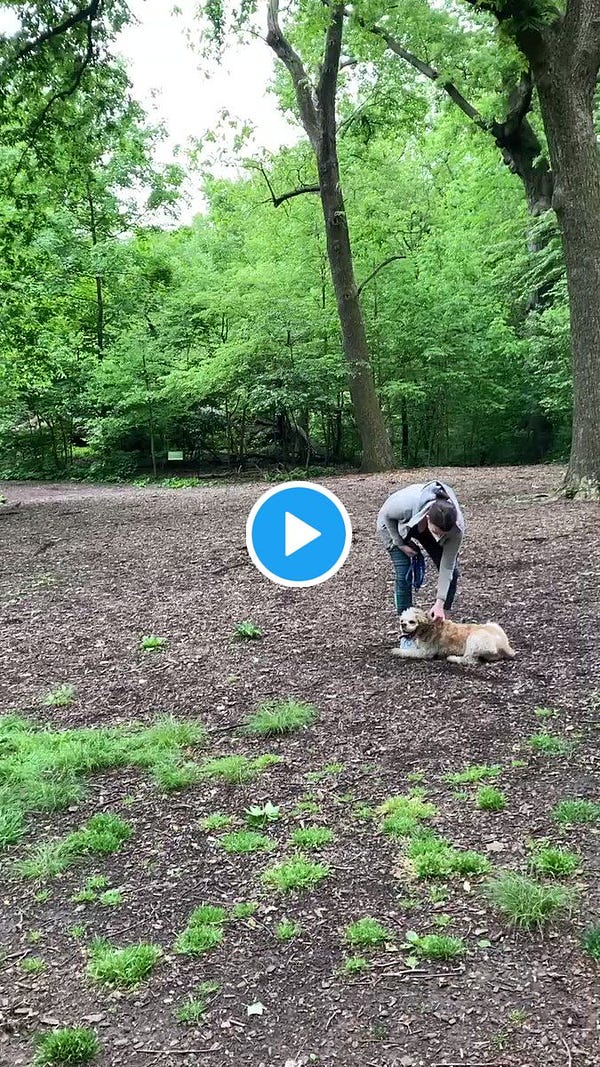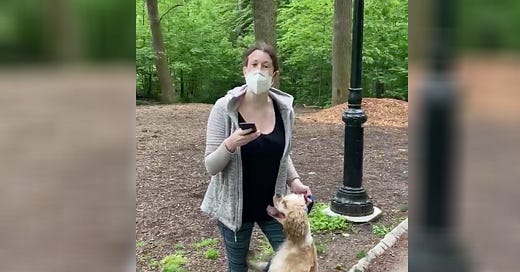You are by now likely aware of the racist altercation that occurred Monday between a white dog owner named Amy Cooper and a black bird watcher named Christian Cooper (no relation). If you’re an Offline Person and/or white, please know the incident I’m about to walk us through is a definitive instance of a white person weaponizing racism to incite violence against a black person.
In a video recorded by Christian in New York City’s Central Park on Monday morning, Amy is heard threatening to call police on Christian for recording her, saying, “I’m gonna tell them there’s an African American man threatening my life.”
In his Facebook post shared on Monday morning, Christian lays out what happened, writing that he encountered Amy and her unleashed dog in the Ramble, an area of the park popular for birding. He informed her that dogs must be leashed in the Ramble, and attempted to give the dog treats when she didn’t put its leash back on. From Christian’s post:
I pull out the dog treats I carry for just for such intransigence. I didn't even get a chance to toss any treats to the pooch before Karen scrambled to grab the dog.
HER: DON'T YOU TOUCH MY DOG!!!!!
That's when I started video recording with my iPhone, and when her inner Karen fully emerged and took a dark turn..
In the video, Amy, fiddling with her dog’s collar, looks up to see Christian filming and asks him to stop, while walking toward him. He asks her to keep away from him, and she puts her hand in his face before she says she’s going to call the cops. “I’m gonna tell them there’s an African American man threatening my life,” she says. She keeps a grip on her dog’s collar as she calls the police.
“I’m sorry, I’m in the Ramble, and there’s a man, African American, he has a bicycle helmet. He’s recording me and threatening me and my dog,” she says.
She continues after a pause, her voice becoming more panicked: “There is an African American man. I am in Central Park. He’s recording me, and threatening myself and my dog.”
Her dog yelps to be let go as she says she can’t hear the operator, then begins to shout: “I’m being threatened by a man in the Ramble, please send the cops immediately! I’m in Central Park in the Ramble, I don’t know!” She bends down to clip the leash to the dog’s collar, and Christian says, “Thank you.” The video ends there.
The damning video of the interaction has been watched 3.2 million times on Facebook. It’s gotten far more attention on Twitter, where it was posted by Christian’s sister Melody Cooper and has been viewed 36.3 million times.


I think at first watch, Amy’s actions can be equated with those of a “BBQ Becky” or a “Permit Patty,” or a general “Karen,” nicknames given to white women who have been featured in viral videos for interrogating and calling the cops on black people who are going about their own business.
But what happened here, while similar, was far more sinister, as it revealed just how white people, and more specifically white women, have always gone about using racism to bring harm to black people, more specifically black men.
It’s clear not just from Amy’s words, but from her tone, that she understands how this works: that she can get police to bring violence against Christian by accusing him of making threats — even as he fails to display threatening behavior — and by leaning on racism to bolster her claim: “I’m gonna tell them there’s an African American man threatening my life.”
Amy’s insistence that she is the one who needs the police even as she flouts Central Park leashing rules is privilege embodied, but her carrying out her plan is white supremacy in action: I am white, and because I am white, I have the credibility to accuse you, a black person, of threatening me, and I will be believed, and because of that, you should fear me.
Her behavior is reminiscent of similar actions taken by white women across history. In 1931, two white women falsely accused nine black teenagers, aged 13 to 19, of raping them on a freight train traveling between Chattanooga, TN, and Memphis. Known as the “Scottsboro Boys,” all but one were convicted and sentenced to death. In 1949, four black men in Florida, known as the “Groveland Four,” were accused of rape by a white teenager. Three were convicted on dubious evidence and one was killed before trial — shot 400 times by a lynch mob. They were posthumously pardoned just last year.
Under white supremacy, white womanhood is treated as delicate and sacred, defended by white men to preserve whiteness itself. We remember the 1955 lynching of 14-year-old Emmett Till, accused of flirting and making physical and verbal advances at a white woman. More recently, we remember the 2017 revelation that the woman whom Till allegedly flirted with, Carolyn Bryant, had admitted in 2007 that her testimony was false.
Though she didn’t tell her husband of Till’s alleged behavior, her false testimony helped he and his brother avoid any punishment for kidnapping and murdering Till. “Nothing that boy did could ever justify what happened to him,” she said.
Nothing that Christian Cooper did would have justified what might have happened to him had police immediately followed up on Amy Cooper’s allegations. According to the New York Police Department, both people had left the area by the time they arrived. But her crocodile tears are violence nonetheless, indicative of a system that continues to value white women and weigh their credibility by their proximity to whiteness, and assumes black men as perpetrators. Her intent was clear: I will be believed because of my race and yours.
The internet has taken hold of Amy Cooper’s behavior and she’s been punished outside of the law. She was shamed online, obviously. Her dog — which inspired an entirely separate social media frenzy — has been returned to the facility she adopted it from. She was placed on administrative leave by her employer, then fired. Christian is OK, his sister tweeted, and left after Amy leashed her dog. Christian, however, told the New York Times that he disagreed with the backlash against Amy:
“It’s a little bit of a frenzy, and I am uncomfortable with that,” he said. “If our goal is to change the underlying factors, I am not sure that this young woman having her life completely torn apart serves that goal.”
Christian’s reaction is understandable in one sense. The ability for people to seek justice for the actions of this one woman might seem small compared to the broader, unrelenting, fatal violence against black people in this country, and the lack of movement states have taken to seek justice or allow communities to grieve. Ahmaud Arbery’s murderers weren’t arrested until months after he was killed in February. The March death of Breonna Taylor, shot and killed by Louisville Metro Police Department officers in Kentucky, gained little traction until Arbery’s death went viral. On Tuesday night, Minneapolis police shot rubber bullets and tear gas at protesters demonstrating against the death of George Floyd, who was murdered by Minneapolis police. All three of these victims are black.
But I still think Amy’s behavior must be interrogated and understood by white people, because her actions and those of, for instance, the Minneapolis police who killed George Floyd must be seen as points on the same spectrum. The inherent white supremacist violence that Amy knew she could call upon in her defense is the same violence that ended George Floyd’s life, and that assaulted the people protesting his killing.
It’s also worth zeroing in on what Amy did because of what she wrote in her apology, blasted across the internet via PR Newswire, emphasis mine:
I am well aware of the pain that misassumptions and insensitive statements about race cause and would never have imagined that I would be involved in the type of incident that occurred with Chris.
She would have never imagined that it would be her. She thought she was the kind of white person who wouldn’t think of using racism and her whiteness to get the police to stop a black man from recording her and feeding her dog. She thought she was a “good” white person. But no white person is exempt from racism and the racial bias learned by living in a world that values white people. Even if you’re marginalized in other ways, your whiteness has shown you that the world will not discriminate against you because of your race, and will give you preferential treatment because of it. Even as a mixed person I know I’m not exempt from racism and racial bias, because I was raised in a world that values my whiteness and my proximity to it.
Writer Tracy Clayton, a black bird watcher herself, tweeted about this yesterday: “White people need to be brave and confront their fear of being called racist so that they can confront the actual racism that's in there.”

All white people are capable of this violence. Of using their race and racism to bring credibility to their accusations regardless of validity. Of using racism to bring harm to black people and people of color. And they must confront and understand this idea that, regardless of their education or intention or community, they have a learned racial bias that makes them capable of this violence, and that racist systems allow this violence to continue and prosper.
Upending racism will depend on white people to do the work. If we can’t accept the concept that Amy Cooper is not an anomaly but a regularity, we can’t go forward.
Screenshot via melodyMcooper/Twitter; Remix by Samantha Grasso






Good stuff. Thanks for this.
Yes.